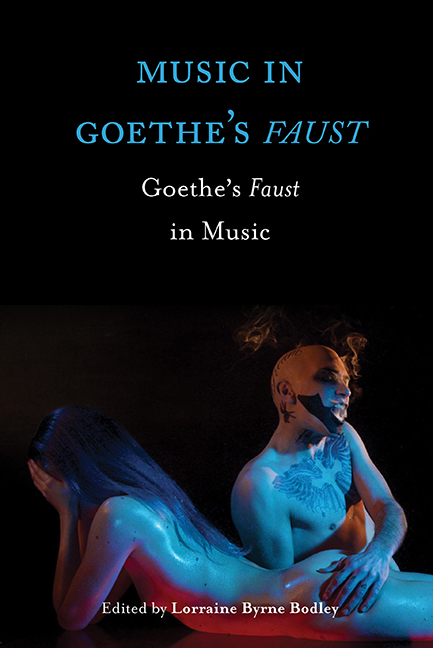Book contents
- Frontmatter
- Dedication
- Contents
- List of Illustrations
- Contributors
- Acknowledgements
- Abbreviations Used in the Notes
- Introduction. Rhapsody and Rebuke: Goethe's Faust in Music
- Part I Goethe's Faust: Content and Context
- Part II Legacies: Goethe's Faust in the Nineteenth Century
- Part III Topographies: Stagings and Critical Reception
- Part IV New Directions: Recent Productions and Appropriations
- 15 As Goethe Intended? Max Reinhardt's Faust Productions and the Aesthetics of Incidental Music in the Early Twentieth Century
- 16 Music and the Rebirth of Faust in the GDR
- 17 Music, Text and Stage: Peter Stein's Production of Goethe's Faust
- 18 ‘Devilishly good’: Rudolf Volz's Rock Opera Faust and ‘Event Culture’
- Select Bibliography
- Index
16 - Music and the Rebirth of Faust in the GDR
from Part IV - New Directions: Recent Productions and Appropriations
Published online by Cambridge University Press: 30 August 2017
- Frontmatter
- Dedication
- Contents
- List of Illustrations
- Contributors
- Acknowledgements
- Abbreviations Used in the Notes
- Introduction. Rhapsody and Rebuke: Goethe's Faust in Music
- Part I Goethe's Faust: Content and Context
- Part II Legacies: Goethe's Faust in the Nineteenth Century
- Part III Topographies: Stagings and Critical Reception
- Part IV New Directions: Recent Productions and Appropriations
- 15 As Goethe Intended? Max Reinhardt's Faust Productions and the Aesthetics of Incidental Music in the Early Twentieth Century
- 16 Music and the Rebirth of Faust in the GDR
- 17 Music, Text and Stage: Peter Stein's Production of Goethe's Faust
- 18 ‘Devilishly good’: Rudolf Volz's Rock Opera Faust and ‘Event Culture’
- Select Bibliography
- Index
Summary
Since the foundation of the GDR in 1949 Goethe had been claimed by the ruling Socialist Unity Party (SED) as the distinguished literary father figure of the state. This stemmed from the GDR's official claim to be the legitimate cultural successor of all progressive and humanist elements in the German tradition. The SED promoted the classical heritage (‘Erbe’) of Goethe and Schiller on the school curriculum and theatres around the GDR. As Wolfgang Emmerich writes, Goethe was emphasised as ‘“das Vorbild eines stets arbeitenden Menschen” […], dessen Wesen “von einem tätigen Humanismus erfüllt” gewesen sei’ [‘the model of a constantly working person’ whose being was fulfilled ‘by an active humanism’].
By the mid-1950s the SED's claims with regard to the ‘Erbe’ were to intensify, culminating in the belief that it was the historical mission of the GDR to become the realisation (‘Vollstrecker’) of the humanist tradition. If, as Nicholas Boyle states in ‘Wagering on Modernity’ in this volume, Goethe's Faust ‘is a modern man in the Nietzschean sense that he has left Christianity behind him’, the GDR took this one historical step further, in reinterpreting him as the prophet of a new socialist order. This was illustrated in relation to Faust's vision at the end of Faust II, when he proclaims: ‘Solch ein Gewimmel möcht’ ich sehn, / Auf freiem Grund mit freiem Volke stehn.’ [Such busy, teeming throngs I long to see, / Standing on freedom's soil, a people free]. For the SED the GDR work force could be interpreted as the embodiment of this vision. In March 1962 SED leader Walter Ulbricht asserted that the GDR workers had already begun to write this third part of Faust. As Vietor-Engländer points out, particularly the image of the ‘freies Volk auf freiem Grund’ was constantly referred to by GDR politicians between 1961 and 1971 and was still invoked during the commemorations of the 150th anniversary of Goethe's death in 1982.
- Type
- Chapter
- Information
- Music in Goethe's FaustGoethe's Faust in Music, pp. 262 - 275Publisher: Boydell & BrewerPrint publication year: 2017



